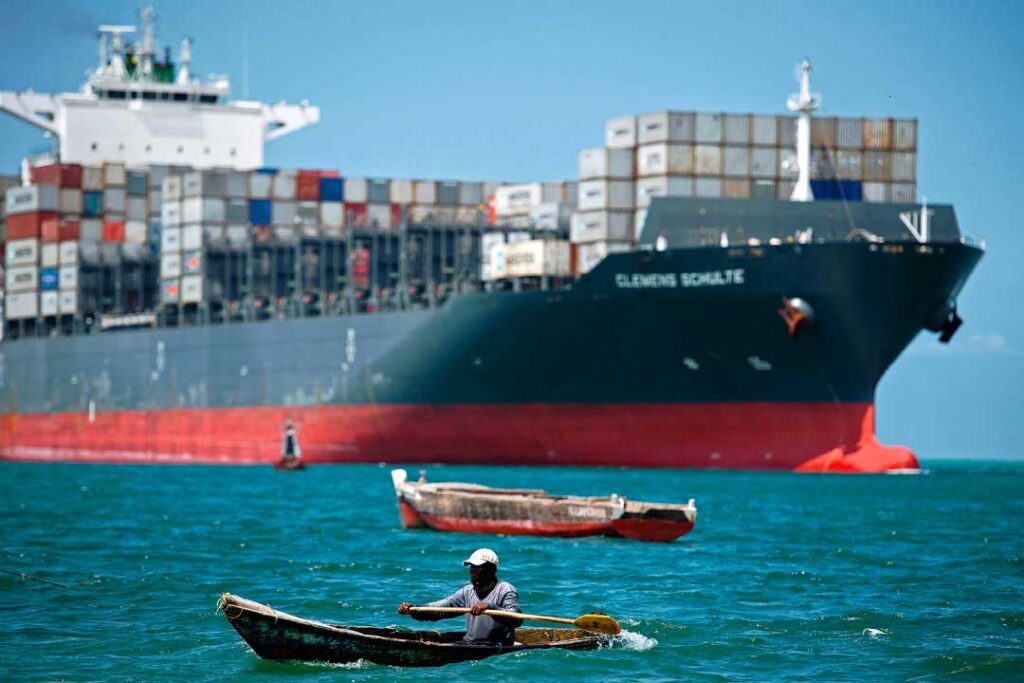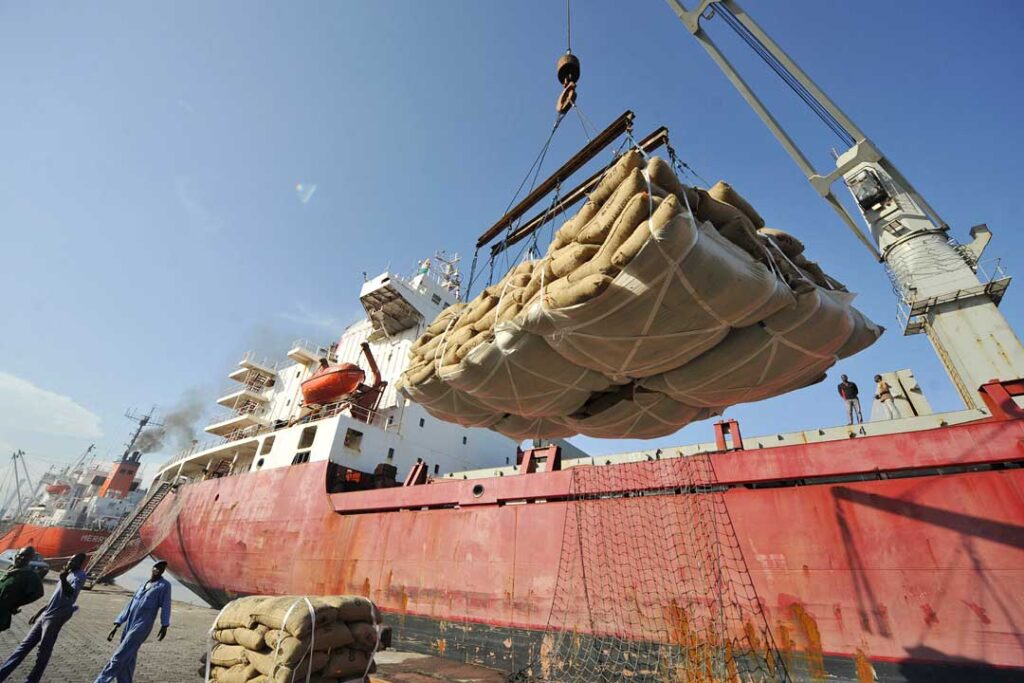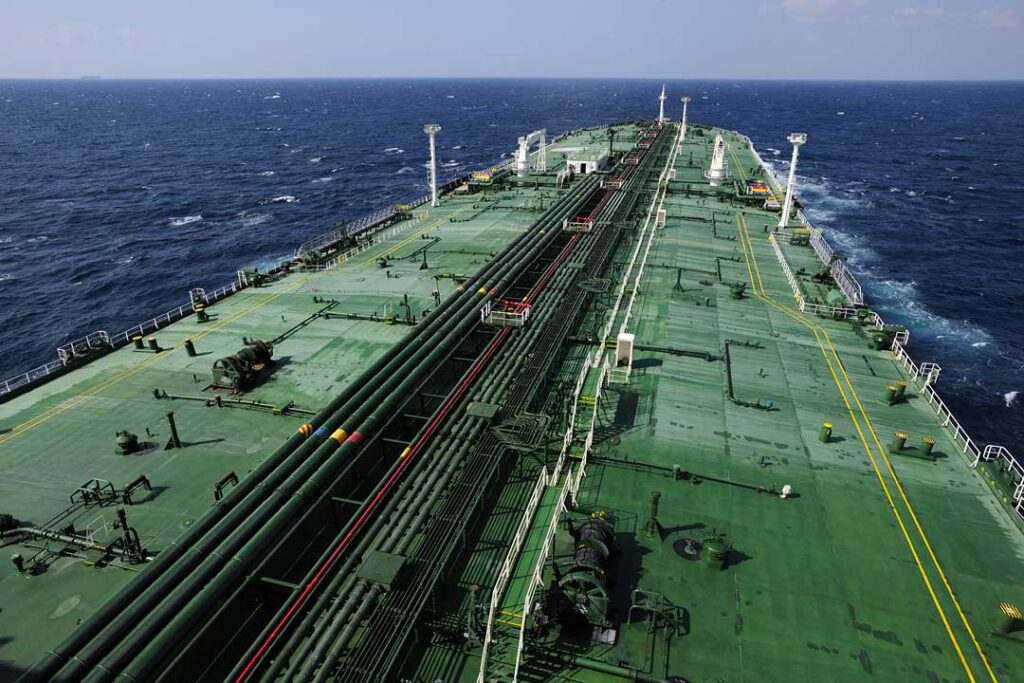According to the World Bank, the blue economy is the “sustainable use of ocean resources for economic growth, improved livelihoods, and jobs while preserving the health of the ocean”. The blue economy has great potential to contribute to higher and faster GDP growth across Africa. The continent’s seafood, aquaculture, and fisheries industries employ 12.3 million people, at least a third of whom are women.
The sector provides food security and nutrition for more than 200 million Africans. It is also a vital source of foreign currency and tax revenue, and its contribution to African GDP is almost 2%. Moreover, Africa’s 38 coastal and island states access more than 30,000 km of coastline along the Atlantic and Indian oceans, two of the planet’s most extensive waters.
Yet despite its vast potential, Africa’s transition to a blue economy is still in its infancy. The development of this potential faces several barriers: weak coordination at the highest levels, poor infrastructure development, a lack of funding, and the turmoil generated by the COVID-19 pandemic and the Ukraine war.

Despite these challenges, the African Union estimates that the blue economy currently generates nearly $300 billion for the continent, creating 49 million jobs in the process. These and other crucial benefits—most notably food security, livelihoods, and biodiversity—are entirely dependent on the ocean’s health.
There are several compelling reasons why the blue economy is now generating excitement that it may be the next big continental bet.
The first is geopolitics. As noted by Anil Sooklal of South Africa’s Department of International Relations and Cooperation (DIRCO), the Indian Ocean and its littoral states are increasingly at the epicentre of the evolving global geopolitical architecture. The Indian Ocean provides a vast maritime space and sea lanes that connect the great economies of the West and East. It is home to one-third of the world’s population, 25% of its land mass, and 40% of the world’s oil and gas reserves. As a result, the region is set to become a leading source of new global growth over the next 20 years. Its strategic access, energy resources and national security importance are driving commercial and security investments by major powers.
India and China, in particular, have attempted to assert themselves in the region. Quartz’s iconic headline, ‘Xi sells Seychelles by India’s seashore’, succinctly summed up these evolving power dynamics and competition between the two Asian powers. Now, as Beijing, New Delhi and a host of other great powers continue to navigate these seas, both literally and metaphorically, there will be some tough choices for African policymakers to consider. While growing strategic competition involving both external powers may be subject to risks and exploitation, it will also create leverage and significant development and investment opportunities.
This push is further supported by regional initiatives. The thrust of Africa’s blue economy drive comes from Agenda 2063, the African Union’s (AU) 50-year social and economic development framework that seeks to grow Africa into a global economic powerhouse. Moreover, 90% of Africa’s trade is transported by sea, and as the continent begins to ramp up trade under the African Continental Free Trade Area (AfCFTA), there is an urgent need to improve trade channels and leverage the economic endowments of its ocean resources.
The next driver is climate change, which is having a significant impact on the region’s economic transformation as countries attempt to move from vulnerability to resilience. This is especially pronounced for the continent’s Small Island Developing States (SIDS) nations, which are most exposed to the acute risks caused by climate change. Now, as the world accelerates decarbonisation efforts, the blue economy (like the green economy) represents low-hanging fruit for Africa. However, as observed by Kenyan developmental economist Anzetse Were, much of the focus (and funding) thus far has been on climate mitigation, whereas there are significant climate adaptation opportunities that have not yet been fully seized. She specifically highlights the emerging opportunities arising in untapped areas such as fisheries and aquaculture, water security and tourism as being ripe for investment.

To be sure, the opportunities are vast. Meeting global food demand requires the development of sustainable food supply chains anchored on coastal communities and sustainable production. Marine resources are vital to ensuring food security, and Africa is set to play a critical role in this regard. As Christopher Costello noted in a paper written for the ‘High-Level Panel for a Sustainable Ocean Economy’ in 2019, “ocean health and ocean wealth go hand-in-hand. If we make rapid and far-reaching changes in the way we manage ocean-based industries while nurturing the health of their ecosystems, we can bolster our long-term food security and the livelihoods of millions of people.”
But it won’t be plain sailing. The continent faces multiple maritime security threats around its oceans and seas with the Gulf of Guinea in West Africa, the Gulf of Aden and down to the Mozambique Channel, and the Mediterranean and Red Seas all deemed vulnerable areas. As analysed by the Institute of Security Studies, continued instability and insecurity at sea undermine states’ ability to secure trade routes, protect and harness the benefits of their blue economies, and ensure inclusive economic growth.
That said, maritime security is a key enabler of the blue economy through safeguarding navigation routes, providing important oceanographic data to marine industries, and protecting rights over valuable marine resources and activities within claimed zones of maritime jurisdiction. Moreover, maritime security itself is a source of economic development and growth. An expanded blue economy creates greater demand for maritime security capabilities, which in turn triggers increased investment and growth in these capabilities.
The combination of global, regional, and environmental factors is shifting both the types and modes of funding, catalysing investment in the sector.
Given these trends, which countries are best placed to capitalise on this new wave of momentum? In an African context, the three leading lights are the Seychelles, Mauritius, and South Africa, which all have a unique set of comparative advantages.
Seychelles is a leader in capital market debt issuance for the blue economy. As early as 2008, Seychelles re-engineered its finance strategy and retooled its diplomatic service to leverage on oceans under the banner of the blue economy, seeing it as an anchor for economic development and a flag for the Indian Ocean archipelago’s foreign policy. Leveraging its strategic positioning, the Seychelles has courted interest from across the Middle East, Asia, and Africa as well as multilateral and regional bodies across the world – including the Alliance of Small Island States (AOSIS), the Indian Ocean Commission (IOC), the Indian Ocean Rim Association (IORA), the AU and the United Nations.

In Mauritius, territorial waters are more than a thousand times larger than the landmass of the island, making them critical from a GDP contribution and governance point of view. The blue economy represents more than 10.5% of Mauritius’s national GDP, with total direct employment estimated at more than 20,000, excluding coastal tourism. Tapping into the economic potential of the ocean has required thoughtful policy, planning, and management as policymakers have attempted to double the sector’s contribution to GDP by 2025. For Mauritius, fishing and aquaculture are essential components of coastal tourism, attracting many visitors seeking marine leisure activities. Renewable marine energy is another significant opportunity, with the development of sustainable energy sources from waves and oceanic currents. Shipbuilding, marine biotechnology, oceanographic research, maritime transport and marine resource conservation and management are other areas of investment and innovation supported by the blue economy.
The South African government’s plan to grow a sustainable blue economy is called Operation Phakisa. The initiative is targeting four key areas of blue-economic growth: marine transport and manufacturing; aquaculture; offshore oil and gas; and, ultimately, marine protection. The government estimates the oceans bordering South Africa on three sides, giving it a coastline almost 4,000 km long, have the potential to add R177 billion to GDP and create more than one million jobs by 2033. The government’s easing of private-sector participation hurdles for renewable energy projects should see more stable fixed investment inflows to fund infrastructure.
Meanwhile, countries such as Ghana, Kenya and Nigeria are still in the early stages of developing their blue economy agendas but have ambitious growth strategies. Nigeria plans to build Africa’s largest floating dockyards and operate its ports 24 hours a day. But the reality of the situation in these countries demands overcoming severe challenges. Piracy off the African west coast is an ongoing concern, while Ghana has seen a dramatic decline in fish stocks due to an inability to police its waters effectively.
Arguably the most important challenge to overcome, however, is that of financing. Current fiscal constraints will limit government investment in crucial infrastructure such as electricity, ports, and patrol vessels. To offset the lack of public sector resources, African governments should focus attractive investment incentives on critical sectors. This tactic would encourage the private sector to help build the institutions and infrastructure necessary to implement their blue economies.
The good news is that momentum is building. Several blue financing instruments have emerged over the past couple of years that have driven much-needed investment into the sector, as observed by Maram Ahmed, in a recent piece for CNBC. For example, Seychelles issued the world’s first sovereign blue bond in 2018, using debt for nature swaps—a blue financing mechanism. The issuance of blue bonds is fairly new, but it is a valuable instrument for raising capital from investors to finance marine and ocean-based projects that have positive environmental, economic and climate benefits. Indeed, blue bonds have the potential to be as impactful as green bonds, of which $1 trillion have been issued since their inception in 2007.
The blue economy offers a sea of untapped potential, presenting African nations with the means to diversify their economies, create sustainable jobs and alleviate poverty. As the continent now scales up its resilience to climatic shocks, such adaptation measures will create dynamic opportunities for the private sector to play alongside the public sector, offering an array of new trade and investment opportunities. Success, like in most sectors on the continent, will hinge on policy consistency and coordination, sound regulatory mechanisms and improved political will, as well as adequate private sector inclusion. But as policy momentum and investor interest grow across the continent, there is optimism that the rush for “blue gold” could be a game changer for the continent.

RONAK GOPALDAS is a director at Signal Risk, an exclusively African risk advisory firm. He was previously the head of country risk at Rand Merchant Bank (RMB) for a number of years, where he managed a team who provided the firm with in-depth analysis of economic, political, security and operational dynamics across sub-Saharan Africa. He holds a BCom degree in philosophy, politics and economics (PPE) and a BCom (Hons) from the University of Cape Town (UCT). He also has an MSc in finance (economic policy) through the School of Oriental and African Studies (SOAS) in London.[


